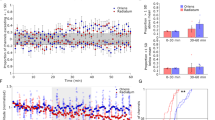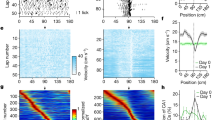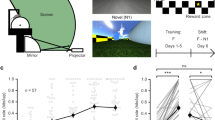Abstract
Experience-dependent long-lasting increases in excitatory synaptic transmission in the hippocampus are believed to underlie certain types of memory1,2,3. Whereas stimulation of hippocampal pathways in freely moving rats can readily elicit a long-term potentiation (LTP) of transmission that may last for weeks, previous studies have failed to detect persistent increases in synaptic efficacy after hippocampus-mediated learning4,5,6. As changes in synaptic efficacy are contingent on the history of plasticity at the synapses7, we have examined the effect of experience-dependent hippocampal activation on transmission after the induction of LTP. We show that exploration of a new, non-stressful environment rapidly induces a complete and persistent reversal ofthe expression of high-frequency stimulation-induced early-phase LTP in the CA1 area of the hippocampus, without affecting baseline transmission in a control pathway. LTP expression is not affected by exploration of familiar environments. We found that spatial exploration affected LTP within a defined time window because neither the induction of LTP nor the maintenance of long-established LTP was blocked. The discovery of a novelty-induced reversal of LTP expression provides strong evidence that extensive long-lasting decreases in synaptic efficacy may act in tandem with enhancements at selected synapses to allow the detection and storage of new information by the hippocampus.
This is a preview of subscription content, access via your institution
Access options
Subscribe to this journal
Receive 51 print issues and online access
$199.00 per year
only $3.90 per issue
Buy this article
- Purchase on Springer Link
- Instant access to full article PDF
Prices may be subject to local taxes which are calculated during checkout



Similar content being viewed by others
References
Martinez, J. & Derrick, B. Long-term potentiation and learning. Annu. Rev. Psychol. 47, 173–203 (1996).
Jeffery, K. LTP and spatial learning—Where to next? Hippocampus 7, 95–110 (1997).
Morris, R. G. M. & Frey, U. Hippocampal synaptic plasticity: role in spatial learning or the automatic recording of attended experience? Phil. Trans. R. Soc. Lond. B 352, 1489–1503 (1997).
Hargreaves, E. L., Cain, D. P. & Vanderwolf, C. Learning and behavioral long-term potentiation: importance of controlling for motor activity. J. Neurosci. 10, 1472–1478 (1990).
Erickson, C. A., McNaughton, B. L. & Barnes, C. A. Comparison of long-term enhancement and short-term exploratory modulation of perforant path synaptic transmission. Brain Res. 615, 275–280 (1993).
Moser, E., Moser, M.-B. & Andersen, P. Potentiation of dentate synapses initiated by exploratory learning in rats: dissociation from brain temperature, motor activity, and arousal. Learning Memory 1, 55–73 (1994).
Abraham, W. C. & Bear, M. F. Metaplasticity: the plasticity of synaptic plasticity. Trends Neurosci. 19, 126–130 (1996).
O'Keefe, J. & Nadel, L. The Hippocampus as a Cognitive Map (Clarendon, Oxford, (1978)).
Eichenbaum, H. Is the rodent hippocampus just for ‘place’? Curr. Opin. Neurobiol. 6, 187–195 (1996).
Green, J. & Arduini, A. Hippocampal electrical activity in arousal. J. Neurophysiol. 17, 553–557 (1954).
Bland, B. The physiology and pharmacology of hippocampal formation theta rhythms. Progr. Neurobiol. 26, 1–54 (1986).
Buzsáki, G. Two stage model of memory trace formation: a role for noisy brain states. Neuroscience 31, 551–570 (1989).
Huang, Y.-Y., Nguyen, P., Abel, T. & Kandel, E. Long-lasting forms of synaptic potentiation in the mammalian hippocampus. Learning Memory 3, 74–85 (1996).
Stäubli, U. & Lynch, G. Stable depression of potentiated synaptic responses in the hippocampus with 1–5 Hz stimulation. Brain Res. 513, 113–118 (1990).
Doyle, C. A., Cullen, W. K., Rowan, M. J. & Anwyl, R. Low-frequency stimulation induces homosynaptic depotentiation but not long-term depression of synaptic transmission in the adult anaesthetized and awake rat hippocampus in vivo. Neuroscience 77, 75–85 (1997).
Manahan-Vaughan, D. Group 1 and 2 metabotropic glutamate receptors play differential roles in hippocampal long-term depression and long-term potentiation in freely moving rats. J. Neurosci. 17, 3303–3311 (1997).
Errington, M. L. et al. Stimulation at 1–5 Hz does not produce long-term depression or depotentiation in the hippocampus of the adult rat in vivo. J. Neurophysiol. 74, 1793–1799 (1995).
Huerta, P. & Lisman, J. Bidirectional synaptic plasticity induced by a single burst during cholinergic theta oscillation in CA1 in vitro. Neuron 15, 1053–1063 (1995).
Staübli, U. & Chun, D. Factors regulating the reversibility of long-term potentiation. J. Neurosci. 16, 853–860 (1996).
Parkin, A. J. Human memory: novelty, association and the brain. Curr. Biol. 7, R768–R769 (1997).
Grunwald, T., Lehnertz, K., Heinze, H. J., Helmstaedter, C. & Elger, C. E. Verbal novelty detection within the human hippocampus proper. Proc. Natl Acad. Sci. USA 95, 3193–3197 (1998).
Honey, R. C., Watt, A. & Good, M. Hippocampal lesions disrupt an associative mismatch process. J.Neurosci. 18, 2226–2230 (1998).
Gluck, M. & Myers, C. Psychobiological models of hippocampal function in learning and memory. Annu. Rev. Psychol. 48, 481–514 (1997).
Miller, K. Synaptic economics: competition and cooperation in synaptic plasticity. Neuron 17, 371–374 (1996).
Dudai, Y. Consolidation: fragility on the road to the engram. Neuron 17, 367–370 (1996).
Doyle, C., Holscher, C., Rowan, M. J. & Anwyl, R. The selective neuronal NO synthase inhibitor 7-nitro-indazole blocks both long-term potentiation and depotentiation of field EPSPs in rat hippocampal CA1 in vivo. J. Neurosci. 16, 418–424 (1996).
Xu, L., Anwyl, R. & Rowan, M. J. Behavioural stress facilitates the induction of long-term depression in the hippocampus. Nature 387, 497–500 (1997).
Leung, L. Behavior-dependent evoked potentials in the hippocampal CA1 region of the rat 1. Correlation with behavior and EEG. Brain Res. 198, 95–117 (1980).
Moser, E., Mathiesen, I. & Anderson, P. Association between brain temperature and dentate field potentials in exploring and swimming rats. Science 259, 1324–1326 (1993).
Acknowledgements
This research was supported by the Health Research Board of Ireland, the European Union DGXII and the Wellcome Trust. We thank W. K. Cullen and J. Wu for assistance.
Author information
Authors and Affiliations
Rights and permissions
About this article
Cite this article
Xu, L., Anwyl, R. & Rowan, M. Spatial exploration induces a persistent reversal of long-term potentiation in rat hippocampus. Nature 394, 891–894 (1998). https://doi.org/10.1038/29783
Received:
Accepted:
Issue Date:
DOI: https://doi.org/10.1038/29783
This article is cited by
-
d-Aspartate consumption selectively promotes intermediate-term spatial memory and the expression of hippocampal NMDA receptor subunits
Scientific Reports (2021)
-
Cellular-resolution mapping uncovers spatial adaptive filtering at the rat cerebellum input stage
Communications Biology (2020)
-
A protein phosphatase 2A deficit in the hippocampal CA1 area impairs memory extinction
Molecular Brain (2019)
-
Tau- but not Aß -pathology enhances NMDAR-dependent depotentiation in AD-mouse models
Acta Neuropathologica Communications (2019)
-
Differential sensitivity of three forms of hippocampal synaptic potentiation to depotentiation
Molecular Brain (2019)
Comments
By submitting a comment you agree to abide by our Terms and Community Guidelines. If you find something abusive or that does not comply with our terms or guidelines please flag it as inappropriate.



